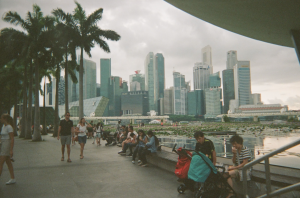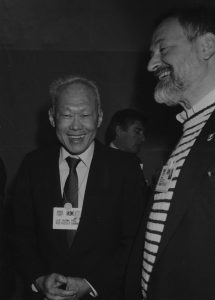Unveiling Singapore’s Censorship of the Media
by ArrthyThayaparan
The democratic nation of Singapore ranks 158th in the 2020 World Press Freedom Index due to rampant media censorship and introduction of anti-fake news laws.

Singapore Cityscape / Photo by Arrthy Thayaparan
Singapore, a country infamous for having the world’s best international airport, strict laws banning chewing gum, and being known as the “Switzerland of the East”. This small, democratic city-state is often thought of as a cultured, peaceful society. However, behind the facade of cleanliness, security and harmony therein lies a darker truth of mass suppression of media freedom.
Despite international views of a democratic nation, the Singaporean constitution maintains laws to control the media and continues to introduce reforms to further restrict criticisms of the government. Most recently in 2019, the government introduced the Protection from Online Falsehoods and Manipulation Act (POFMA) – which was intended to curb dissemination of disinformation, but has instead allowed government officials to shut down their critics. By evaluating the plights of Singaporean journalists, further knowledge is attained in understanding how the loss of power by the media impacts the role it plays in society.
Background
To truly understand the relationship between the Singaporean government and media, we first need to understand how the country is run. In spite of being a multi-party nation, Singapore’s centre-right People’s Action Party (PAP) has maintained an overwhelming majority since 1959. In opposition, there is the liberal Singapore Democratic Party and the centre-left Workers’ Party of Singapore – but neither party has any chance of gaining power and governing the state.
This is in part due to a single family maintaining control of the PAP for much of its time in power. Current Prime Minister Lee Hsien Loong is the son of Singapore’s first Prime Minster, Lee Kuan Yew. Yew is well-considered to be the founding father of the nation and is credited to developing Singapore into a first-world country.

“Lee Kuan Yew – World Economic Forum Annual Meeting 1990” by World Economic Forum is licensed under CC BY-NC-SA 2.0
As the founding and continued majority party, PAP has established much of Singapore’s constitutional framework. As a result, PAP has been able to undermine opposition and maintain power for over 60 years. In situations such as this, international or local critics will often arise to ensure the government is being held accountable for their actions and decisions – but where are Singapore’s critics? Why has the PAP been held unaccountable for monopolizing on the nation’s administration? Are they truly as influential as they seem?
Control of Media in Singapore
To answer these questions, one simply must look at the two major players in Singaporean media: Singapore Press Holdings (SPH) and MediaCorp. While both companies dominate online media in the country, SPH is known to have a monopoly of the press and has direct links to the PAP. As such, PAP’s influence goes to the very core of the media industry.
Regardless of government influence, journalists over the years have courageously published critical content. As expected, this content was not well-received by the government and provoked harsh penalties as a result. Journalists in Singapore that go against the status quo can expect to be sued, challenged regarding employment, or even forced to leave the country.
In 2019, this history of disregard for the media deteriorated further through the adoption of POFMA. This act allows the government to order media outlets and digital platforms to correct or remove content deemed ‘incorrect’ by government officials. Failure to comply with orders can result in heavy fines and up to a year in prison. By the end of 2019, POFMA was invoked five times against critical bloggers and even the political opposition.
The affect of the law has been vast, with the PAP’s control becoming further embedded in the digital world. But surprisingly, Singaporean society has not been blind to these issues.While the government is keen to establish itself as the arbitrators of truth in the country, citizens are growing more aware of their rights and the necessities of a true democratic society.
“SG Journalism is not failing due to lack of funds, it is due to lack of real journalists and a free press,” wrote Tony Serio regarding a Today Online article, “Taking risks, investigating corruption, getting whistleblowers to open up is all part of the business not being a PAP spokesperson.”
Who has the Power?
As an international community, it’s difficult to hold countries accountable for their lack of press freedom. Institutions such as Reporters Without Borders assist through collection of data and an annual list charting changes across the world. In 2020, Singapore came 158 out of 180 countries in the RSF’s press freedom index – classified as a ‘very bad’ situation for freedom of speech and press.
If anything, the best that can be hoped for is a societal realization and call for better media standards. However, in spite of growing awareness, 48% of Singaporeans believe that social harmony outweighs the benefits of a free press. This is likely due to the lack of free press in the country – people are unsure what that entails and how it benefits them as citizens.
As such, in the case of Singapore, rampant propaganda promoting the PAP and strict censorship of the media has undermined the role of news media and journalism entirely. In doing so, it is the people – the citizens of Singapore – who are the most affected by this denial of expression and information. Without a free press, people are unable to be objectively informed of ongoing events; instead they are told what to believe and not to question the authorities that determine the ‘truth’.
Works Cited
Facebook bows to Singapore’s ‘fake news’ law with post ‘correction’. (2019, November 30). Retrieved from https://www.bbc.com/news/world-asia-50613341
Guest, P. (2019, July 19). Singapore Says It’s Fighting ‘Fake News.’ Journalists See a Ruse. Retrieved from https://www.theatlantic.com/international/archive/2019/07/singapore-press-freedom/592039/
Griffiths, J. (2019, November 30). Singapore just used its fake news law. Critics say it’s just what they feared. Retrieved from https://www.cnn.com/2019/11/29/media/singapore-fake-news-facebook-intl-hnk/index.html
Singapore. (2020). Retrieved from https://freedomhouse.org/country/singapore/freedom-world/2020
Singapore : An alternative way to curtail press freedom: Reporters without borders. (2020). Retrieved from https://rsf.org/en/singapore
Tandoc, E. C., Jr. (2020, May 24). Singapore. Retrieved from https://www.digitalnewsreport.org/survey/2019/singapore-2019/
Tey, T. H. (2015, September 04). Confining the Freedom of the Press in Singapore: A “Pragmatic” Press for “Nation-Building”? Retrieved from https://gsdrc.org/document-library/confining-the-freedom-of-the-press-in-singapore-a-pragmatic-press-for-nation-building/
The political framework of Singapore. (2020). Retrieved from https://www.nordeatrade.com/en/explore-new-market/singapore/political-context
Zannia, N. (2018, January 02). Singapore readers state that they refuse to pay for propaganda masqueraded as news. Retrieved from https://www.onlinecitizenasia.com/2018/01/02/singapore-readers-state-that-they-refuse-to-pay-for-propaganda-masqueraded-as-news/